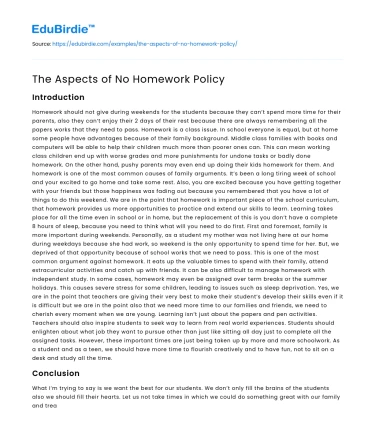Introduction
Homework should not give during weekends for the students because they can’t spend more time for their parents, also they can’t enjoy their 2 days of their rest because there are always remembering all the papers works that they need to pass. Homework is a class issue. In school everyone is equal, but at home some people have advantages because of their family background. Middle class families with books and computers will be able to help their children much more than poorer ones can. This can mean working class children end up with worse grades and more punishments for undone tasks or badly done homework. On the other hand, pushy parents may even end up doing their kids homework for them. And homework is one of the most common causes of family arguments.
It’s been a long tiring week of school and your excited to go home and take some rest. Also, you are excited because you have getting together with your friends but those happiness was fading out because you remembered that you have a lot of things to do this weekend. We are in the point that homework is important piece of the school curriculum, that homework provides us more opportunities to practice and extend our skills to learn. Learning takes place for all the time even in school or in home, but the replacement of this is you don’t have a complete 8 hours of sleep, because you need to think what will you need to do first.
First and foremost, family is more important during weekends. Personally, as a student my mother was not living here at our home during weekdays because she had work, so weekend is the only opportunity to spend time for her. But, we deprived of that opportunity because of school works that we need to pass.
Save your time!
We can take care of your essay
- Proper editing and formatting
- Free revision, title page, and bibliography
- Flexible prices and money-back guarantee
This is one of the most common argument against homework. It eats up the valuable times to spend with their family, attend extracurricular activities and catch up with friends. It can be also difficult to manage homework with independent study. In some cases, homework may even be assigned over term breaks or the summer holidays. This causes severe stress for some children, leading to issues such as sleep deprivation. Yes, we are in the point that teachers are giving their very best to make their student’s develop their skills even if it is difficult but we are in the point also that we need more time to our families and friends, we need to cherish every moment when we are young.
Learning isn’t just about the papers and pen activities. Teachers should also inspire students to seek way to learn from real world experiences. Students should enlighten about what job they want to pursue other than just like sitting all day just to complete all the assigned tasks. However, these important times are just being taken up by more and more schoolwork. As a student and as a teen, we should have more time to flourish creatively and to have fun, not to sit on a desk and study all the time.
Conclusion
What I’m trying to say is we want the best for our students. We don’t only fill the brains of the students also we should fill their hearts. Let us not take times in which we could do something great with our family and treasure every moment for the rest of their lives. Weekends are the perfect time to get a couple of days without having to worry about completing homework, and if all teachers were not going to give homework/assignment then there will be the improvement in the student attitude towards actually doing homework during the week.






 Stuck on your essay?
Stuck on your essay?

